Introduction

Whatever the Bible may or may not truly teach, the idea of an eternal hell — a realm of punishment for sins committed on earth — has been so thoroughly entrenched into society through religious figures, folktales, art, and popular culture, that it becomes almost impossible to disassociate it from the Bible at all.
Does an eternal hell exist in the Biblical texts? Is this the plan of an all knowing, and all loving God? We are told to repent and believe the Good News. Does it sound “Good” if the majority of the world’s population will spend eternity in a torture chamber? Or could the Good News be that all will be “judged according to their works” and correctively punished in order to enter the kingdom of God?
The Bible being a collection of dozens of books, written mostly in Hebrew and Greek, with some Aramaic, was being translated into other languages long before English had even evolved as a language itself.
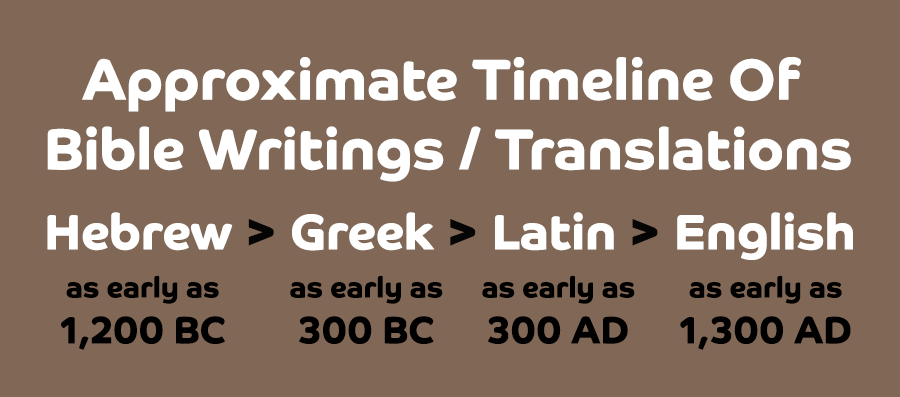
As a result, there are numerous translations and interpretations of the original text, which has led to considerable ambiguity regarding its original meaning. For this reason, it is crucial to look into these specifics in order to determine the genuine meaning of the Bible.
With this in mind, here are 7 arguments against the notion of an everlasting punishment in the Bible.
1. Accurate Translations Show Correctional Judgment, Not Eternal Torment
Compare two different Bible translations:
And, these shall go away, into, age-abiding, correction, but, the righteous, into, age-abiding, life.
Rotherham Emphasized (REB)
Versus:
And these will go away into eternal punishment, but the righteous into eternal life.
Matthew 25:46 English Standard (ESV)
Now simply ask yourself: Which translation sounds more like something Jesus would say?
But I say to you, love your enemies, and pray for those who persecute you
Matthew 5:44 English Standard (ESV)
It’s hard to believe that the idea of loving your enemies would be to torture them for an eternity, but by changing the definition of only one or two words, this becomes a reality to unsuspecting readers. Let’s look at a breakdown of these two keywords in this passage:
Eternal vs Age-abiding or age lasting
Strong Concordance:
“aion” is translated as “ages”
so that in the coming ages he might show the immeasurable riches of his grace in kindness toward us in Christ Jesus.
Ephesians 2:7 English Standard Version (ESV)
Notice that if this were translated “..so that in the coming eternities” it would make no sense, and yet:
.. and what will be the sign of your coming and of the end of the age?”
Matthew 24:3 NIV
Likewise, does anyone think the question was when will “the end of the eternity” be?
“aion” is translated as “forever”
This is the bread that came down from heaven, not like the bread the fathers ate, and died. Whoever feeds on this bread will live forever.
John 6:58 English Standard Version (ESV)
John 6:58 compared with other translations:
..He that feedeth upon this bread, shall live unto times age-abiding.
John 6:58 Rotherham Emphasized (EBR)
..he who is eating this bread shall live — to the age.’
Young’s Literal Translation (YLT)
If the translators choose when aiṓn/aiṓniosit is Eternal vs Age, readers should be made aware and be able to come to their own conclusions.
Punishment vs correction and testing
kolasis – correction
Choosing the word “punishment” over “correction” may just be a matter of looking at the glass half empty versus half full, though if you have a preconceived idea that people should be tormented for an eternity, “correction” would hardly be the word you would want to use in this case.
Test Vs Torment
..They will be tormented day and night for ever and ever.
Revelation 20:10 (NIV)
The Greek root word for “tormented” in this passage is:
basanos – a touchstone (a dark stone used in testing metals)
The book of Revelation is written in Greek, but here we see a Latin word “torment” used in English which means “twist and bend” or, torture.

Touchstones are used to test the purity of precious metals like gold or silver. By scraping a portion of gold onto a touchstone and applying solvent, the impurities are dissolved, leaving behind the true value of its worth. By this same method, people will be tested for the purity of their work.
Additionally, Revelation 20:10 uses the plural “aions and aions” or in other words “for eternities and eternities” which makes little to no sense.
A more accurate rendering of the passage would be:
“..They will be tested day and night unto the ages of ages.”
2. The Word Hell Means Grave, Not Torture Chamber
Hell

The world hell itself is originally from the Norse Goddess and place of the dead.
How did Hel, the Norse god of the underworld, become synonymous with the Judeo-Christian concept of eternal punishment?
In the old testament, sheol is the Hebrew word for the abode of the dead – or grave – where both good and bad people go upon death. It’s likened to that of a sleep with no consciousness. Sleep/DeathAccording to the Lord’s word, we tell you that we who are still alive, who are left until the coming of the Lord, will certainly not precede those who have fallen asleep.
1 Thessalonians 4:15 NIV
When the Hebrew bible became preserved in the ancient Greek language, the word Sheol was translated as “Hades”, the closest equivalent for “grave”. Hades would later become “Inferno” in Latin (a word we now equate with fire) “Hölle” in German and “hel” or “hell” in English. You can still see the root of hell in words like “helm” or “helmet” which means to cover like a grave.Helma helmet, a defensive cover for the head, from Old English helm ‘protection, covering; crown, helmet,’ from Proto-Germanic *helmaz ‘protective covering’, from PIE root *kel- ‘to cover, conceal, save.’ Italian elmo, Spanish yelmo are from Germanic.
https://www.etymonline.com/word/helm
Jacob in Hell
Consider the following verse:
And all his sons and all his daughters rose up to comfort him; but he refused to be comforted; and he said, For I will go down into the grave [SHEOL] unto my son mourning. Thus his father wept for him.
Genesis 37:35 King James Version
Jacob hears the false news that his favorite son Joseph has died and envisions himself being reunited with him in sheol (the grave) upon his own death.
The King James Bible translators used sheol as grave this time but as we have seen, they could have just as easily written hell instead. So why didn’t they? Probably because no one would believe that Jacob would be eager to join his favourite son being tortured for an eternity.
Hell Cast Into Hell
Many people think that hell is the lake of fire, and yet, in the book of Revelation hell is cast into the lake of fire:
And death and hell were cast into the lake of fire. This is the second death.
Revelation 20:14 (KJV)
Other translations use Hades instead of hell as saying hell is cast into what is thought of as hell is probably confusing.
Gehenna
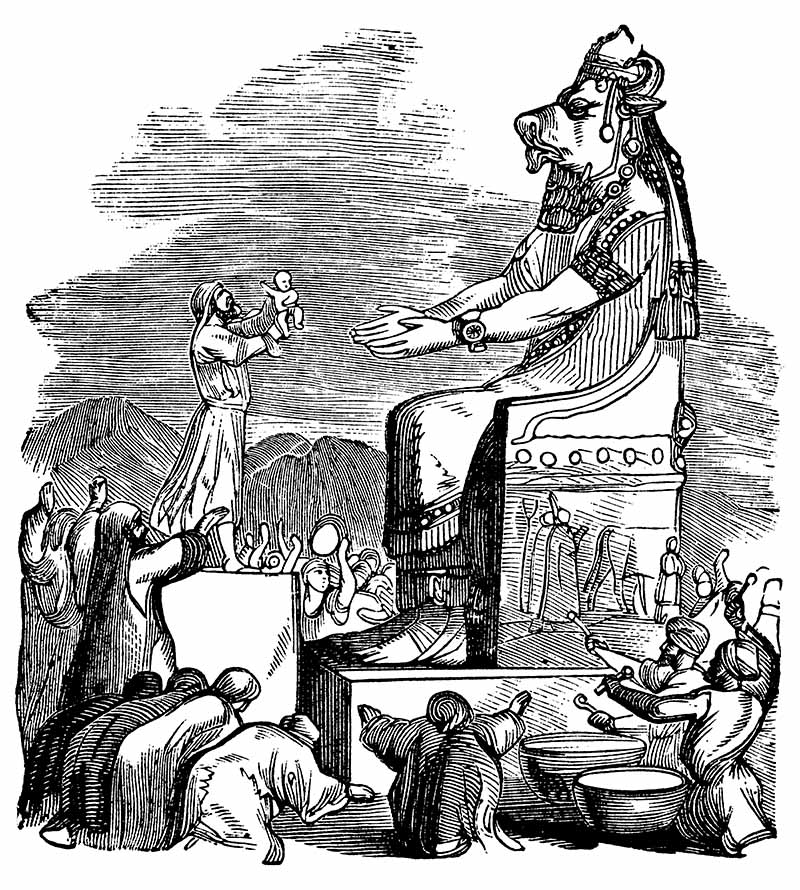
Another word translated as hell is Gehenna.
Gehenna, or the valley of Hinnom, is a place situated to the south of Jerusalem, and would later become used as a symbol of judgment for Israel. It is also the location where Israelites went against God to sacrifice their children to the false god/idol Moloch in the town Topeth:
And they have built the high places of Topheth, which is in the Valley of the Son of Hinnom, to burn their sons and their daughters in the fire, which I did not command, nor did it come into my mind.
Jeremiah 7:31 (ESV)
They built the high places of Baal in the Valley of the Son of Hinnom, to offer up their sons and daughters to Molech, though I did not command them, nor did it enter into my mind, that they should do this abomination, to cause Judah to sin.
Jeremiah 32:35 (ESV)
It should be noted that the very idea of casting children alive into sacrificial fires is seen as an abomination to God – contrasted with the majority view that God will in-turn torment his children in fire eternally.
Because of these terrible acts, TOPHETH/GEHENNA becomes a symbol of JUDGMENT, especially against ISRAEL, something the Jewish elders in Jesus’ time would have understood.
Topeth Symbol of Judgement Against Judah
Therefore, behold, the days are coming, declares the Lord, when it will no more be called Topheth, or the Valley of the Son of Hinnom, but the Valley of Slaughter; for they will bury in Topheth, because there is no room elsewhere. And the dead bodies of this people will be food for the birds of the air, and for the beasts of the earth, and none will frighten them away. And I will silence in the cities of Judah and in the streets of Jerusalem the voice of mirth and the voice of gladness, the voice of the bridegroom and the voice of the bride, for the land shall become a waste.
Jeremiah 7:32-34 ESV
Topeth as a symbol of Judgment against Assyria
And the Lord will make the splendor of His voice heard and reveal His arm striking in angry wrath and a flame of consuming fire, in driving rain, a torrent, and hailstones. Assyria will be shattered by the voice of the Lord. He will strike with a rod… Indeed! Topheth has been ready for the king for a long time now. Its funeral pyre is deep and wide, with plenty of fire and wood. The breath of the Lord, like a torrent of brimstone, kindles it.
Isaiah 30:30-33 HCSB
Jesus uses Gehenna as a symbol against apostate jews - something they would understand
But I tell you, everyone who is angry with his brother will be subject to judgment. And whoever says to his brother, ‘Fool!’ will be subject to the Sanhedrin. But whoever says, ‘You moron!’ will be subject to hellfire [GEHENNA FIRE]..
Matthew 5:22 (HCSB)
I assure you: You will never get out of there until you have paid the last penny!
Matthew 5:26 (HCSB)
Does this sound like eternal fire? If it was, why mention anyone getting out?
Gehenna is mentioned 12 times in the new testament texts and is commonly written as hell in most mainstream English translations, but never translated as hell in the old testament. Jesus was warning the Jewish authorities of coming judgement against them as a result of their sins of killing the prophets of God, and the symbolic language of Gehenna would have been well understood, but the word disappears from usage when the audience changes to gentiles.
Gehenna and hades are two completely different words with different meanings and in order to avoid any unnecessary confusion, neither of them should be translated as hell. How would anyone know which hell is being discussed if there are multiple meanings and root words? Why not translate sheol and hades as grave or realm of the dead, and Gehenna as Gehenna, Topheth or the Valley of Hinnom?
3. Egyptian Cults & Governments Taught Eternal Punishment
Afterlife in Egypt
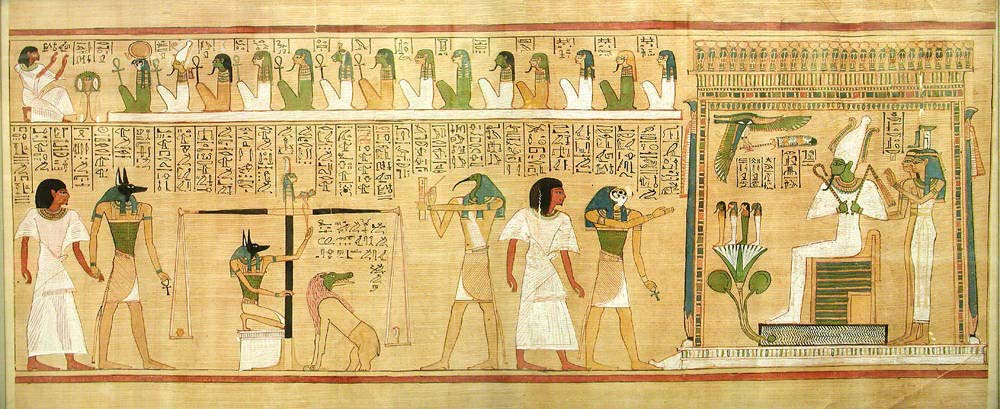
The ancient Egyptian beliefs of gods and the afterlife are too numerous to count. However, the most accepted understanding was that upon death, Osiris (god of fertility, judgement and the underworld) would weigh the works of the individual’s heart on a scale to determine the final destination of the soul. If their works were accepted as good, they would enter the Elysian fields (field of reeds) in a bodily resurrection. If their works were deemed bad, it is commonly taught that they would be punished by being annihilated (annihilationism, being destroyed forever) – however as Sir John Gardner Wilkinson, pioneer and “Father of British Egyptology” thought:
“..the souls which underwent transmigration were those of men whose sins were of sufficiently moderate kind to admit of that purification; the unpardonable sinner being condemned to eternal fire.”
Sir John Gardner Wilkinson – A Popular Account of the Ancient Egyptians
God Calls Israel to abandon the ways of egypt
I am the LORD thy God, which brought thee out of the land of Egypt, out of the house of bondage.
Deuteronomy 5:6 (ERV)
God Calls burning children in fire detestable
and after they have been destroyed before you [the pagan nations], be careful not to be ensnared by inquiring about their gods, saying, “How do these nations serve their gods? We will do the same.” You must not worship the LORD your God in their way, because in worshiping their gods, they do all kinds of detestable things the LORD hates. They even burn their sons and daughters in the fire as sacrifices to their gods.
Deuteronomy 12:30-12:31 NIV
Are we to believe this is detestable, but God burning his children for eternity is love?
Ancient historians' perspectives on religious stories used by the State to frighten and subdue the multitudes
“It is a course which perhaps would not have been necessary had it been possible to form a state composed of wise men, but as every multitude is fickle, full of lawless desires, unreasoned passion, and violent anger, the multitude must be held in by invisible terrors and suchlike pageantry. For this reason I think, not that the ancients acted rashly and at haphazard in introducing among the people notions concerning the gods and beliefs in the terrors of hell, but that the moderns are most rash and foolish in banishing such beliefs.”
“Every illiterate and uninstructed man is yet a child, and takes delight in fable. With the partially informed it is much the same; reason is not all-powerful within him, and he still possesses the tastes of a child… As we relate to children pleasing tales to incite them [to any course] of action, and frightful ones to deter them…So numbers of our citizens are incited to deeds of virtue by the beauties of fable, when they hear the poets in a strain of enthusiasm recording noble actions, such as the labours of Hercules or Theseus, and the honours bestowed on them by the gods, or even when they see paintings, sculptures, or figures bearing their romantic evidence to such events. In the same way they are restrained from vicious courses, when they think they have received from the gods by oracles or some other invisible intimations, threats, menaces, or chastisements, or even if they only believe they have befallen others. The great mass of women and common people, cannot be induced by mere force of reason to devote themselves to piety, virtue, and honesty; superstition must therefore be employed, and even this is insufficient without the aid of the marvellous and the terrible. For what are the thunderbolts, the ægis, the trident, the torches, the dragons, the barbed thyrses, the arms of the gods, and all the paraphernalia of antique theology, but fables employed by the founders of states, as bugbears to frighten timorous minds.”
Buddhism Hell
We also see a multitude of hells (Naraka) in Buddhism which describe various torture methods for the person to undergo including being continuously cut into pieces with axes and eaten alive by beasts, among other horrific punishments. Some are described lasting as long as 3.39738624×1018 years in length at a time, but because of the nature of reincarnation in Buddhism, there is no telling how many times someone might go through these tortures.

The infamous “Wang Saen Suk Hell Garden” depicting various tortures of the Buddhist hell, image from the Bohemian Blog.
Islamic Hell Jahannam
Islam was growing by 600 AD, and its sacred book, the Quran, would also contain the Egyptian myth of an endless fiery torture in what they call Jahannam. Although it should be acknowledged that there are some Muslims who do not accept eternal torment as a potential verdict, these are strong texts from the Quran that seem to indicate this:
“They will long to leave the Fire, but never will they leave there from; and theirs will be a lasting torment.”
Quran 5:37 Sahih International
Those who followed will say, “If only we had another turn [at worldly life] so we could disassociate ourselves from them as they have disassociated themselves from us.” Thus will Allah show them their deeds as regrets upon them. And they are never to emerge from the Fire.
Quran 2:167 Sahih International
Indeed, those who disbelieve and commit wrong [or injustice] – never will Allah forgive them, nor will He guide them to a path. Except the path of Hell; they will abide therein forever. And that, for Allah, is [always] easy.
Quran 4:168-169 Sahih International
An-Nu‘mān ibn Bashīr reported that the Prophet said: “The least tortured one among the dwellers of Fire on the Day of Judgment is a man who will have two live coals placed underneath his feet that will cause his brain to boil. He will think that none is tortured more than him, while he is the least tortured.”
Sahih/Authentic. – [Al-Bukhari and Muslim]
With stories, paintings, and representations of hellfire, demons, and other tortuous concepts rooted in Egypt, these teachings would pave the way for the dark ages and further solidify the notions of endless misery among the majority.
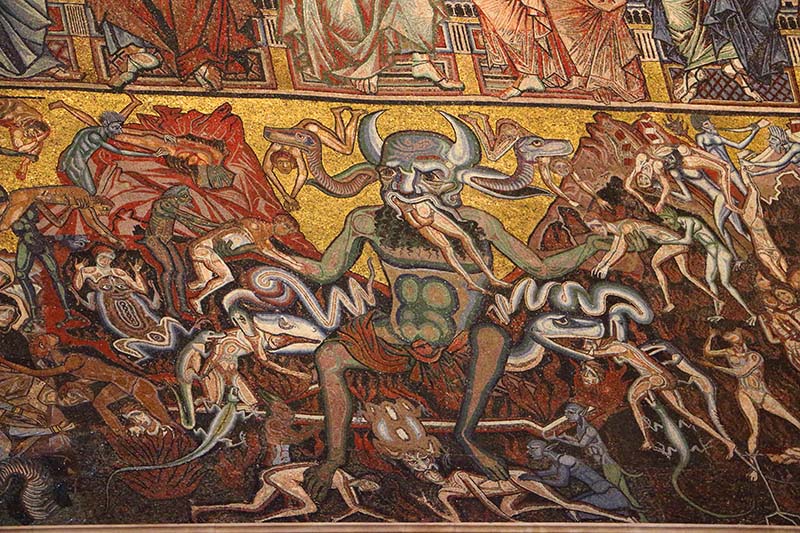
4: God is merciful & caring, and his fire purifies
Saved by Fire
We are frequently exposed to imagery and depictions of God’s fires being used to inflict agony and suffering upon the wicked and unbelievers. However, it is by fire that the Bible says we are saved:
But, if anyone is building, upon the foundation—gold, silver, precious stones, wood, hay, straw, Each one’s work, shall be made, manifest; for, the day, will make it plain, because, by fire, is it to be revealed,—and, each one’s work, of what sort it is, the fire itself will prove:— If, anyone’s work, shall abide, which he built, a reward, shall he receive,— If, anyone’s work, shall be burnt up, he shall suffer loss, but shall, himself, be saved—though, thus, as through fire.
1 Corinthians 3:12-15 Rotherham
Jesus is even shown to batpize with fire:
I baptize you with water for repentance, but he who is coming after me is mightier than I, whose sandals I am not worthy to carry. He will baptize you with the Holy Spirit and fire.
Matthew 3:11 ESV
Is Jesus torturing people by baptizing them in fire, or could it be reflecting his forgiving and healing nature?
The Lake of fire & Brimstone
Strong Concordance:
The lake of fire that burns with brimstone can therefore more accurately be translated as the pond of burning sulfur, which some translations are more accurately translated.Lake of FireAnd the devil, who deceived them, was thrown into the lake of burning sulfur..
Revelation 20:10 NIV
Sulfur
Sulfur is commonly used symbollicaly in God’s judgements throughout the scriptures.Lake of FireAnd the devil, who deceived them, was thrown into the lake of burning sulfur..
Revelation 20:10 NIV
Sulfur was also used in ancient times to purify temples because of its cleansing properties, and is an essential element required for all living things.

Sulfur is often a lemon-yellow solid; when burned, it transforms into a blood-red liquid and releases a blue flame.
Refined by fire
But who can endure the day of his coming, and who can stand when he appears? For he is like a refiner’s fire and like fullers’ soap. He will sit as a refiner and purifier of silver, and he will purify the sons of Levi and refine them like gold and silver, and they will bring offerings in righteousness to the LORD.
Malachi 3:2-3 (ESV)
Everyone will be salted with fire.
Mark 9:49 (NIV)
God Is Love & Fire
And we have come to know and to believe the love that God has for us. God is love, and the one who remains in love remains in God, and God remains in him.
1 John 4:16 (HCSB)
The Lord our God is merciful and forgiving, even though we have rebelled against him;
Daniel 9:9
for our “God is a consuming fire.”
Hebrews 12:29 (NIV)
Love Your Enemies
But I say to you, love your enemies, and pray for those who persecute you
Matthew 5:44 English Standard (ESV)
5. Teachers, Creeds & Art start dictating translations

Catholic Saint Augustine, who lived from 354 to 430 AD, was a forceful and popular exponent of eternal punishment and other widely held Christian ideas. He was quick to condemn anyone who had the belief that everyone would be saved:
“I must now, I see, enter the lists of amicable controversy with those tender-hearted Christians who decline to believe that any, or that all of those whom the infallibly just Judge may pronounce worthy of the punishment of hell, shall suffer eternally, and who suppose that they shall be delivered after a fixed term of punishment, longer or shorter according to the amount of each man’s sin. In respect of this matter, Origen was even more indulgent; for he believed that even the devil himself and his angels, after suffering those more severe and prolonged pains which their sins deserved, should be delivered from their torments, and associated with the holy angels. But the Church, not without reason, condemned him for this and other errors, especially for his theory of the ceaseless alternation of happiness and misery, and the interminable transitions from the one state to the other at fixed periods of ages..”
Saint Augustine
Perhaps even more disturbing, Catholic Saint Thomas Aquinas (1225-1274) adds that the suffering of those in hell would be delightful to the saints in heaven:
“Wherefore in order that the happiness of the saints may be more delightful to them and that they may render more copious thanks to God for it, they are allowed to see perfectly the sufferings of the damned.”
Thomas Aquinas, Summa Theologica III Supplementum Q.94, Art. 1.
They continued the Egyptian belief of eternal torment and pushed it on their followers, influencing the drafting and dissemination of teachings like the Athanasian creed (around 300–600 AD), which was accepted by the governing churches (Catholic and Protestant alike):
“..Those who have done good deeds will go into eternal life; those who have done evil will go into the everlasting fire. This is the Catholic faith. Everyone must believe it, firmly and steadfastly; otherwise He cannot be saved.”
Athanasian Creed
This would have an impact on artwork that would further strengthen the notion that sinners will suffer for all eternity:
Chapel of Padua
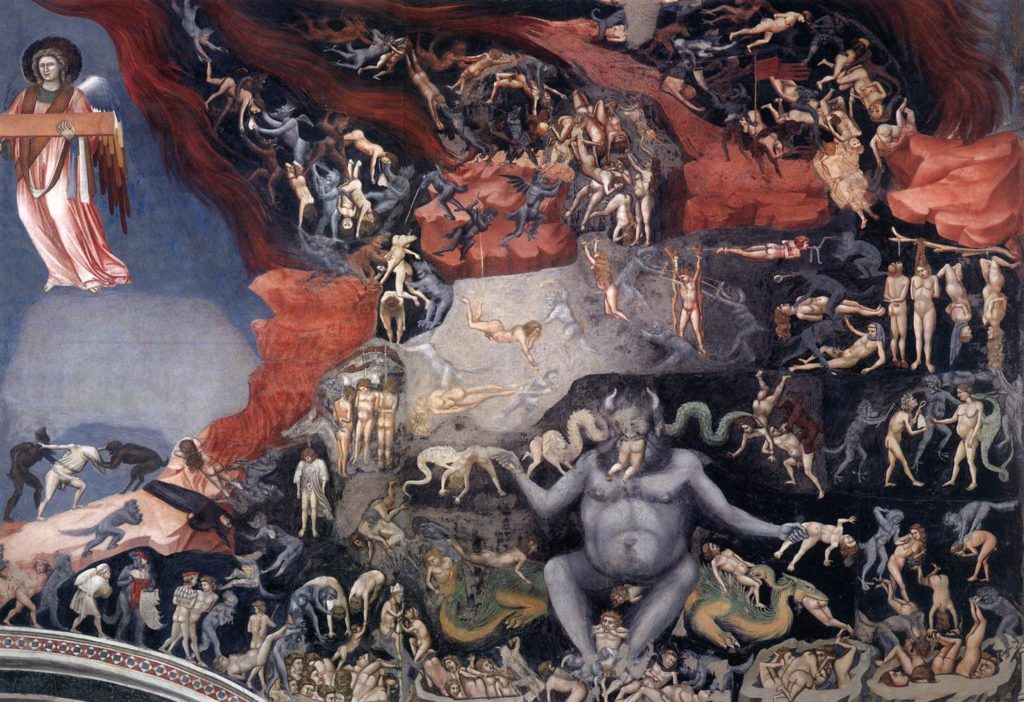
A painting of the “Last Judgement” can be seen in the Scrovegni Chapel of Padua, painted by Giotto di Bondone (1267-1337). A gross, horned monster resembling “Satan” is depicted in the lower right corner standing at the gates of hell, consuming sinners while naked victims are brought to hell by terrifying demons where they are spit-roasted, speared, or forced into deep pits of torment.
Chapel of Padua
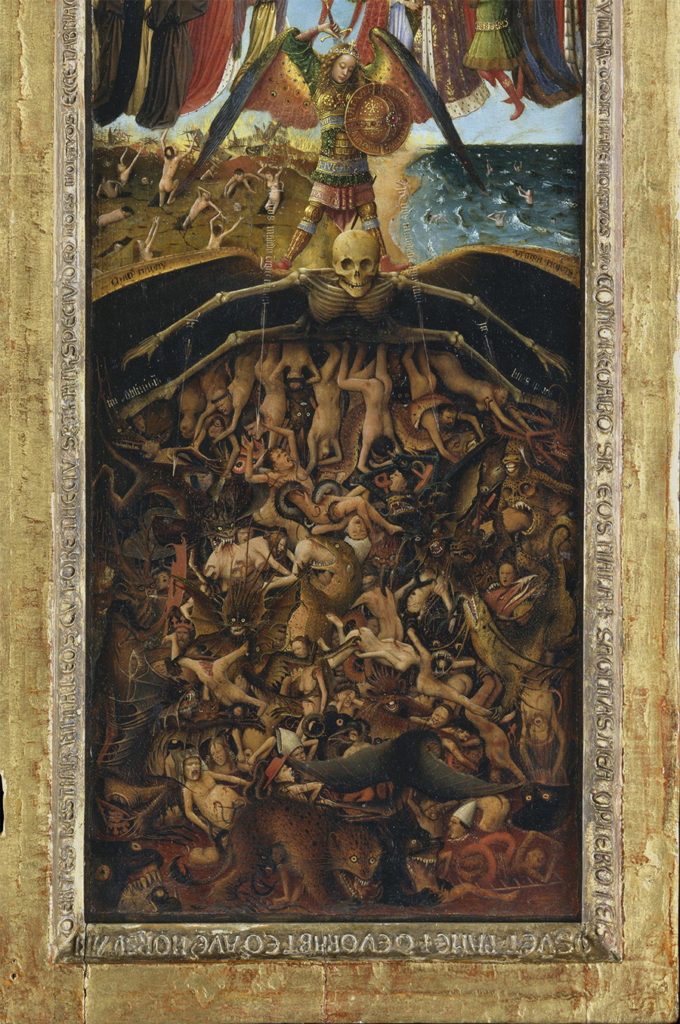
Hell is portrayed by Jan van Eyck (1390-1441) in a similarly gruesome way. Men are seen being disembowelled by serpents, and a demonic-jaguar that is seen eating human flesh. What appears to be a skeletal devil is in charge of many more horrifying tortures, with Christ and his heavenly host in the sky above (not in picture).
King James Bible
No matter what the actual message of the text is, translations will probably reflect these preconceived views if they are commissioned by people who already believe in eternal punishment, especially if there are consequences for not doing so.
As an illustration, the Church of England, which affirms the Athanasian Creed and holds that there is eternal torment in hell, uses the word “hell” more than 50 times in the King James Bible (1604-1611) and will use the phrase “eternal punishment” wherever possible.
6: Cognitive Dissonance, & Child sacrifice
cognitive dissonance
Anxiety that results from simultaneously holding contradictory or otherwise incompatible attitudes, beliefs, or the like, as when one likes a person but disapproves strongly of one of his or her habits.
Dictionary.com
a doubleminded man, unstable in all his ways.
James 1:8 ASV
The idea that a God of love would intend to create billions of children despite knowing the majority of them would suffer for all eternity seems quite contradictory. However, billions of individuals have this belief, which leads them to act completely irrational:

In 2002, a mother named Andrea Yates, killed her five children. When asked why, her response was “To save them from hell.”
Why would killing her children save them from hell? Hell believers are instructed that the majority of people go to hell and that children who have not yet reached the “age of accountability” are exempt from eternal torture. How old is that? It differs from person to person because there is no reference of such a doctrine in the scriptures.
Only a few make it to heaven
“Meditate on the horrors of Hell which will last for eternity because of one easily-committed mortal sin. Try hard to be among the few who are chosen. Think of the eternal flames of Hell, and how few there are that are saved.”
St. Benedict Joseph Labre
Andrea Yates believed that by killing her children, she was immediately granting them entry to heaven and sparing them from suffering for all eternity. This is due to the fact that individuals like her were persuaded by their Christian leaders to believe that “If there is no hell, God is a monster” and to misinterpret biblical passages such as:
“Because narrow is the gate, and narrow is the way, which leads unto life, and few there be that find it”
Matthew 7:14 (NKJV)
If eternal torment is accepted by the believer, this line of scripture is used to imply that the majority of people will go to hell and very few will go to heaven. Andrea Yates believed that killing her children would guarantee their admission to heaven and be justified in order to spare them from the high likelihood that they would be tortured in hell for all eternity if combined with the “age of accountability” doctrine. These doctrines therefore justify and promote a form of child sacrifice.
Hypocrisy of Christian leaders

“If there is no hell, God is a monster”
Fr. Mike Schmitz

“Woe to those who call evil good and good evil, who put darkness for light and light for darkness, who put bitter for sweet and sweet for bitter.”
Isaiah 5:20 (NIV)
Many leaders in Christian thought contend that since humans have “freewill,” those who go to hell do so by their own choice because “God doesn’t want robots.” It’s difficult to understand why someone with a reasonable mind would choose eternal torment over paradise, but this is how they wash their hands clean after presenting such a gruesome view of God. There is simply no biblical evidence for this. It also contradicts scripture that says we are saved by grace, not by our own doing, and if Christ is lifted from the earth, he will draw/drag all people to himself where all will bow and confess to God:
Saved by grace, not by works
For it is by grace you have been saved, through faith—and this is not from yourselves, it is the gift of God— not by works, so that no one can boast.
Ephesians 2:8-9 (NIV)
..when I am lifted up from the earth, will draw [drag] all people to myself.”
John 12:32 (NIV)
for it is written, “As I live, says the Lord, every knee shall bow to me, and every tongue shall confess to God.”
Romans 14:11 (ESV)
Jesus declared that the good shepherd must go out in search of the lone remaining sheep because retrieving the other 99 lost sheep is not sufficient for him:
“What do you think? If a man owns a hundred sheep, and one of them wanders away, will he not leave the ninety-nine on the hills and go to look for the one that wandered off? And if he finds it, truly I tell you, he is happier about that one sheep than about the ninety-nine that did not wander off. In the same way your Father in heaven is not willing that any of these little ones should perish.
Matthew 18:12-14 (NIV)
However, if “narrow is the path to salvation and few” find it,” this story should demonstrate that 99 are lost, while just one is saved.
As absurd as it may sound, if you were to follow this line of reasoning further, it would entail that Christians should actively encourage abortion of unborn children since the child would be admitted to heaven automatically rather than guiding them down the “broad way” of “destruction” that we are led to believe is hell. Given that they are sending their children to heaven, this would defend the Israelites’ decision to sacrifice their infants to Moloch, whom God considers abhorrent and repulsive.
These are just a few of the logical inconsistencies that those who believe in eternal punishment must accept, even though they would probably dispute them.

The Jehovah’s Witnesses believe there are only 144,000 seats in heaven based on their misinterpretation of Revelation 14:1-4.144,000 SeatsThen I looked, and there before me was the Lamb, standing on Mount Zion, and with him 144,000 who had his name and his Father’s name written on their foreheads.
Revelation 14:1 NIV Those who fail to make it are either permanently destroyed (Egyptian annihilationism) or continue living a lesser paradise on earth.
If anyone hears my words but does not keep them, I do not judge that person. For I did not come to judge the world, but to save the world.
John 12:47 NIV
And I, when I am lifted up from the earth, will draw [drag] all people to myself.”
John 12:32 NIV
Teaching that God will lose most of his children to eternal hell means that God is ultimately a failure in his desire to save all mankind:
If anyone hears my words but does not keep them, I do not judge that person. For I did not come to judge the world, but to save the world.
John 12:47 NIV
And I, when I am lifted up from the earth, will draw [drag] all people to myself.”
John 12:32 NIV
Purgatory extortion
Even if you were one of the few faithful Catholics who was headed for paradise, you would probably still have to endure the fiery torment of purgatory for hundreds, thousands, or even more years:
“This fire of Purgatory will be more severe than any pain that can be felt, seen or conceived in this world.” Augustine says in a sermon (xli De Sanctis) Therefore it follows that the pain of Purgatory, both of loss and of sense, surpasses all the pains of this life.
Thomas Aquinas
This enabled the Catholic priesthood, Popes and Kings to convince their subjects that they could do various works to escape the torturing fires of purgatory. They could make payments in the form of “alms” or “tithes” because they conflated the church with the goodness of God, and so, any money going to the church would only increase these efforts.
Similar arguments are used in the Quran to persuade followers to forfeit their lives and possessions in order to spare themselves the agonies of eternal torment:
O you who have believed, shall I guide you to a transaction that will save you from a painful punishment? [It is that] you believe in Allah and His Messenger and strive in the cause of Allah with your wealth and your lives. That is best for you, if you should know. He will forgive for you your sins and admit you to gardens beneath which rivers flow and pleasant dwellings in gardens of perpetual residence. That is the great attainment.
Quran 61:10-12 (Sahih International)
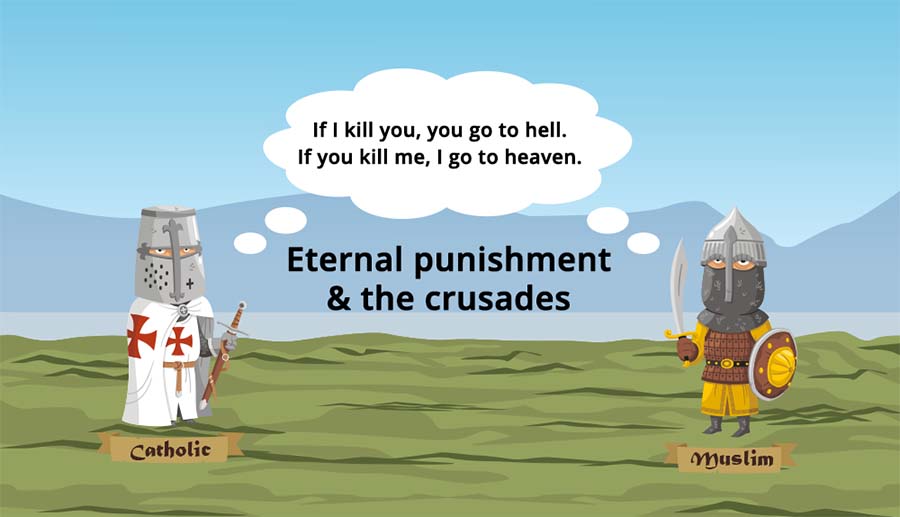
we are not saved by works, but by God’s grace:
For by grace you have been saved through faith. And this is not your own doing; it is the gift of God, not a result of works, so that no one may boast.
Ephesians 2:8-9 ESV
The idea that a loving God will torture most of his created children forever pushes people away from the truth of a loving God:
Here are a few instances of sceptics pointing out the immorality of a loving God torturing the majority of his children forever:

“Remember, God gave you free will so that you have the choice to either worship him or go to hell”
– Ricky Gervais

“Religion has actually convinced people that there’s an invisible man — living in the sky — who watches everything you do, every minute of every day. And the invisible man has a special list of ten things he does not want you to do. And if you do any of these ten things, he has a special place, full of fire and smoke and burning and torture and anguish, where he will send you to live and suffer and burn and choke and scream and cry forever and ever ’til the end of time! But He loves you.”
– George Carlin
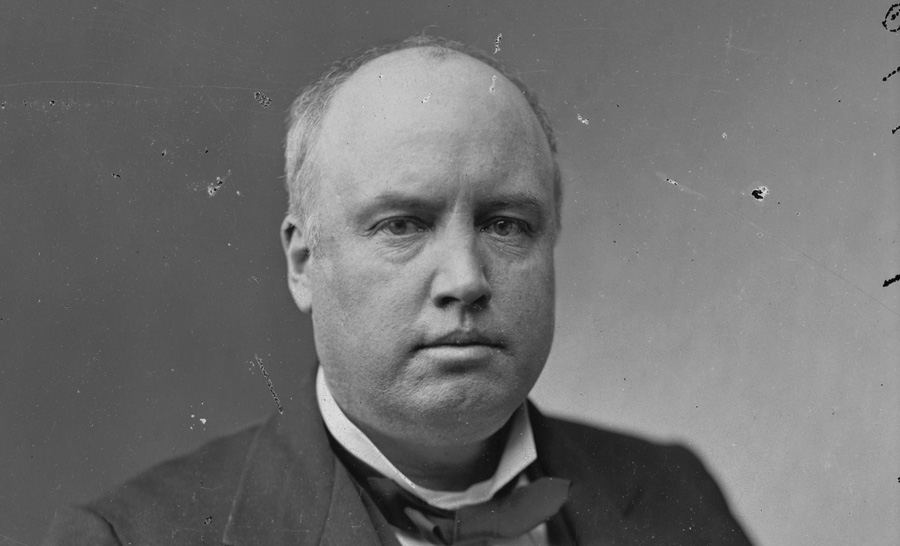
Who can estimate the misery that has been caused by this most infamous doctrine of eternal punishment? Think of the lives it has blighted – of the tears it has caused – of the agony it has produced. Think of the millions who have been driven to insanity by this most terrible of dogmas. This doctrine renders God the basest and most cruel being in the universe. Compared with him, the most frightful deities of the most barbarous and degraded tribes are miracles of goodness and mercy. There is nothing more degrading than to worship such a god. Lower than this the soul can never sink. If the doctrine of eternal damnation is true, let me share the fate of the unconverted; let me have my portion in hell, rather than in heaven with a god infamous enough to inflict eternal misery upon any of the sons of men.
Robert G Ingersol, Infamy of infamies – Morality
7. Closing & Scripture Supporting Reconciliation Of All
We are commanded to love and forgive our enemies.Forgive EnemiesBut I say to you, love your enemies, and pray for those who persecute you
Matthew 5:44 English Standard (ESV) Can God not do the same?
Jesus asks God to forgive those who crucified him.Jesus ForgivenessAnd Jesus said, “Father, forgive them, for they know not what they do.” And they cast lots to divide his garments.
Luke 23:34 (ESV) Are we to believe God will refuse this request?The Son & GodJesus gave them this answer: “Very truly I tell you, the Son can do nothing by himself; he can do only what he sees his Father doing, because whatever the Father does the Son also does.
John 5:19 (NIV)
Are we also supposed to accept that
the gospel – the good newsThe GospelBut he said to them, ‘I must preach the good news of the kingdom of God to the other towns as well; for I was sent for this purpose.’
Luke 4:43 (ESV) – is that God will torment the majority of humanity forever? Or does it convey the idea that:
God will judge and discipline his children based on their deeds,CorrectionAnd, these shall go away, into, age-abiding, correction, but, the righteous, into, age-abiding, life.
Rotherham Emphasized (EBR) allowing them to be corrected and enter God’s kingdom?
A Few Bible Translations Without Hell
Rotherham Emphasized Bible, 1959
Young’s Literal Translation of the Holy Bible, 1898
The Holy Bible In Modern English (Fenton), 1903
The Restoration of Original Sacred Name Bible, 1976
Scripture emphasizing all will be saved
And all people will see God’s salvation.
Luke 3:6 (NIV)
That is why we labor and strive, because we have put our hope in the living God, who is the Savior of all people, and especially of those who believe.
1 Timothy 4:10 (NIV)
And when I am lifted up from the earth, I will draw everyone to myself.
John 12:32 (NLT)
If anyone’s work is burned up, he will suffer loss, though he himself will be saved, but only as through fire.
1 Corinthians 3:15 (ESV)
When he has done this, then the Son himself will be made subject to him who put everything under him, so that God may be all in all.
1 Corinthians 15:28 (NIV)
“As I live, says the Lord, every knee shall bow to me, and every tongue shall CONFESS to God.”
Romans 14:11 (ESV)
and every tongue confess that Jesus Christ is Lord, to the glory of God the Father.
Philippians 2:11 (ESV)
For by grace you have been saved through faith. And this is not your own doing; it is the gift of God, 9 not a result of works, so that no one may boast.
Ephesians 2:8-9 (ESV)
Abraham will surely become a great and powerful nation, and all nations on earth will be blessed through him.
Genesis 18:18 (NIV)
So it is not the will of my Father who is in heaven that one of these little ones should perish.
Matthew 18:14 (ESV)
Are not two sparrows sold for a penny? Yet not one of them will fall to the ground outside your Father’s care. And even the very hairs of your head are all numbered. So don’t be afraid; you are worth more than many sparrows.
Matthew 10:29-31 (NIV)
The Law and the Prophets were until John; since then the good news of the kingdom of God is preached, and everyone forces his way into it.
Luke 16:16 (ESV)
For the Son of Man came to seek and to save the lost.
Luke 19:10 (ESV)
And, every created thing which was in heaven, and upon the earth, and under the earth, and upon the sea, and, all the things in them, heard I, saying—Unto him that sitteth upon the throne, and unto the Lamb, be the blessing, and the honour, and the glory, and the dominion, unto the ages of ages!
Revelation 5:13 (EBR)
This is good, and it is pleasing in the sight of God our Savior, who desires all people to be saved and to come to the knowledge of the truth. For there is one God, and there is one mediator between God and men, the man Christ Jesus,
1 Timothy 2:3-5 (ESV)
The Lord our God is merciful and forgiving, even though we have rebelled against him;
Daniel 9:9
The Father loves the Son and has placed everything in his hands.
John 3:35 (NIV)
Even as thou gavest him authority over all flesh, that, as touching whatsoever thou hast given him, he might give unto them, life age-abiding.
John 17:2 (EBR)
Heaven must welcome Him until the times of the restoration of all things, which God spoke about by the mouth of His holy prophets from the beginning.
Acts 3:21 (HCSB)
And, these shall go away, into, age-abiding, correction, but, the righteous, into, age-abiding, life.
Matthew 24:46 (EBR)
And the Lord will make himself known to the Egyptians, and the Egyptians will know the Lord in that day and worship with sacrifice and offering, and they will make vows to the Lord and perform them. And the Lord will strike Egypt, striking and healing, and they will return to the Lord, and he will listen to their pleas for mercy and heal them.
Isaiah 19:21-22 (ESV)
For from the rising of the sun to its setting my name will be great among the nations, and in every place incense will be offered to my name, and a pure offering. For my name will be great among the nations, says the LORD of hosts.
Malachi 1:11 (ESV)
